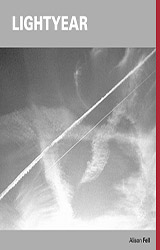Lightyear
Alison Fell
Price: £8.99

Lightyear is the story of a journey from January to December, a walk through the seasons, a year full of outdoor danger and delights. Inspired by the Swedish poet Staffan Söderblom's 'Six October Poems', Lightyear tracks the calendar changes of time and the elements on the body-in-the-landscape. The poems were written in over a three year period, in the country and in the city, in North London, Cornwall, Scotland, Greece and the French Alps. Lightyear is a book for all weathers.
1)
Above the church spire, twin lengths
of tie–dyed sky
joined by a vertical zip:
the plane climbs, clinks like a piggy–
bank, talking the language
of money.
Down here, the inaudible murmur
of the deer and the other animals.
The lawns have demanded to be clipped.
A boy rubs from his eyes the shadow
that sticks to his ball
like a terrifying bedtime story.
Goose–cries now
like a trashy radio left on loud
but distantly.
2)
The poplar is the dark star
of the garden.
People with their jackets
in their hands
pass by slowly.
First red nudge of berries
on the rowan:
luxurious jottings.
The rowan picks up her pen,
aims herself at nothing.
She decides to glisten.
Her hair and her statements
decide to glisten.
3)
The chestnuts are stout fair fellows
lolling in the fallen leaves –
time to be foreign again,
bury all gold for the look
and the shine of it.
I position myself on the café terrace,
half–beast, book half–open
on the sugared table.
Birds swift as sleet on a taxing
wind: each soaked rose
has been written and rewritten.
Spilt milk runs on the flagstones
with the rain.
Old letters are asking
to talk to me.
Time to submit to dismemberment,
and the great intermediary
silences, like the sea's.
4)
Listening from the park
you can hear sky's
dinning grey
the more acutely
when a butterfly's
white quiet cuts across
the grumble
like a feather of
the winter your next
inaudible outbreath
will surely
loosen, make possible.
5)
after J–F. Lyotard
Beyond black trees the sky's
exorbitant sunset
full of light and death.
The sky looking back at its life–
line lowers its eyelids
and laughs at business:
lines of luck or misfortune,
sunstripes painted on the sea
advancing and receding.
The sky is not yet profitable.
Its floods of gold follow
Koranic laws, prohibit usury.
Now dull, now shrill, like the pebbles
crying out to the tide to tumble
them again, again,
now shedding a shower of ash leaves
from its Great Ephemeral Skin,
now standing in for a brand new
fragment of the beautiful.
6)
And sometimes the shoulders
of the sky peaked up and dark
like hanging bats
as if in anger or the fading
hope of wings.
The Jesuits and not the crows
invented sophistry:
these boys
with their pussy–willow
cheeks and old men's hands,
ridged nails, and ravaged
knowing skin.
Job lied. The light of God
is constant.
Fire is the proof, the apparent
simplicity of the thing.
Thumbnail always at the teeth,
the wounds not crossing
the throat's border:
all the questions unasked
of the Great Zero,
all of winter's hungers that won't
come clean.
'Alison Fell is one of the finest poets alive. Her vision is clear and bright, her ear for the music of words is perfect. There are golden lines, blue lines, red lines and crystal lines - such shining, such sweet thunder. With their warmth, wonder, sensuality, humour, sorrow, her poems - counter-pointed vividly by the photographs of Ivan Coleman - are various as the weather. Now and then she reminds me of Keats, of John Clare, Basil Bunting, Caryl Churchill or Duke Ellington at the piano. They would all enjoy walking through and flying over Alison Fell's enchanted landscapes. This is a beautiful book. If it doesn't lift your heart, go jump in a lake.'
Adrian Mitchell
'an exquisite collection'
PN Review